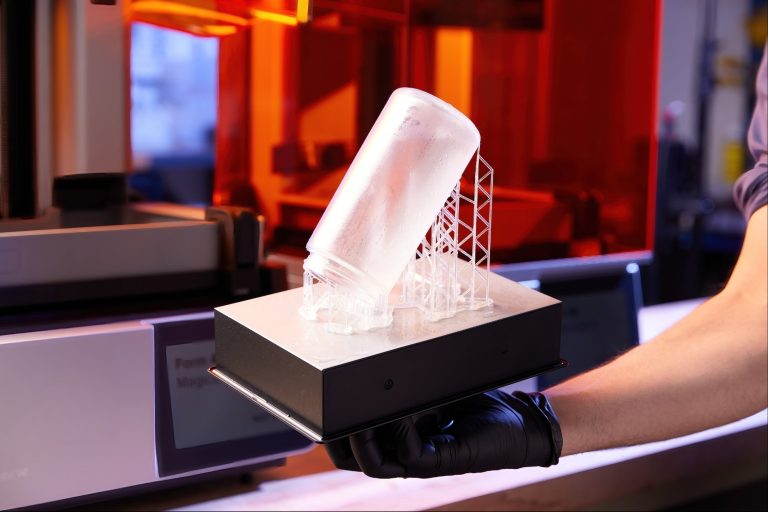
A 3D printer already in use at Microsoft, Ford, and NASA is now commercially available — and it runs on some 3D printed parts itself.
Formlabs, a 3D printing company with a unicorn valuation of $2 billion, launched its first new printer in five years on Wednesday: the Form 4.
A Formlabs rep told Entrepreneur that the new printer can churn out up to 400 models every hour and that anyone can learn how to use the printer in 15 minutes. Formlabs CEO and co-founder Max Lobovsky positioned the printer as a leap ahead for “the entire 3D printing world” because of its accuracy and ease of use, which beta testers at major companies have verified.
The price tag? $4,500.
The Form 4. Credit: Formlabs
A Formlabs spokesperson confirmed to Entrepreneur that the company incorporated “several” 3D printed parts into the final design of the Form 4. These parts were 3D printed on a previous generation of Formlabs printers: the $2,500 Form 3+.
Formlabs put Form 4 to the test against the standard manufacturing process and found that the 3D printer produced more plastic goods in slightly less time — with no observable difference in the end.
The fast production time means that the printer could more easily expand the current use of 3D printing, taking the technology from prototypes and small parts to mass-produced sellable goods like toys and kitchenware that consumers could buy in stores one day.
 A vegetable peeler printed by the Form 4. Credit: Formlabs
A vegetable peeler printed by the Form 4. Credit: Formlabs
Related: Here’s Why Microsoft Is Separating Teams From the Rest of the Office Suite
Formlabs invented the first desktop stereolithography 3D printer 12 years ago after raising $3 million in a Kickstarter campaign.
How Major Companies Use 3D Printers
Earlier generations of Form 4 contributed to new bottle designs at Unilever, customized toys from Hasbro, and parts sent to space.
At Ford, Form 4 is being used to produce manufacturing aids for cars. Dentists, meanwhile, are using it to create retainers for patients.
Mark Honschke, prototyping lead at Microsoft, said that Form 4 was Microsoft’s “go-to” for engineering projects because of its output and speed.
Formlabs’ major competitors are BigRep, Shapeways, and Markforged, according to CB Insights. BigRep collaborated with carmaker Audi to create a 3D-printed car seat and Shapeways secured major contracts in the automotive and transportation industries last year.
Startups have already begun using 3D printers in the real world to create everything from homes to shoes, with construction company Icon creating the world’s largest community of 3D-printed homes in Texas.
Related: I Designed My Dream Home For Free With an AI Architect — Here’s How It Works
Nike is using the technology to create prototypes of custom sneakers, the company confirmed last week.
Footwear startup Zellerfeld, which recently collaborated on a 3D-printed sneaker with Louis Vuitton, has made “no factory, no waste” 3D-printed shoes the core of its business.
 The Form 4 working on a print. Credit: Formlabs
The Form 4 working on a print. Credit: Formlabs
 A bottle printed by the Form 4. Credit: Formlabs
A bottle printed by the Form 4. Credit: Formlabs
 Flame-resistant electrical connectors created by the Form 4. Credit: Formlabs
Flame-resistant electrical connectors created by the Form 4. Credit: Formlabs
Where to Buy a 3D Printer
The global 3D printing market size was $22 billion last year, according to Fortune Business Insights, and is expected to grow to $150 billion by 2032.
Entrepreneurs looking to start with 3D printing don’t necessarily have to buy a high-performance model like Form 4 — though major companies, including consumer product firm OXO, have commended it on its performance. The New York Times tested the Bambu Lab X1 Carbon ($1,200), the Bambu Lab P1P ($700), and the Prusa MK4 ($1,100) and found that they were all able to print faster than expected.
The $169 Ender 3 was the most popular 3D printer sold on Amazon at the time of writing.
The Form 4 can be purchased through Formlabs starting Wednesday. Packages start at $4,500 and go up to $8,700.